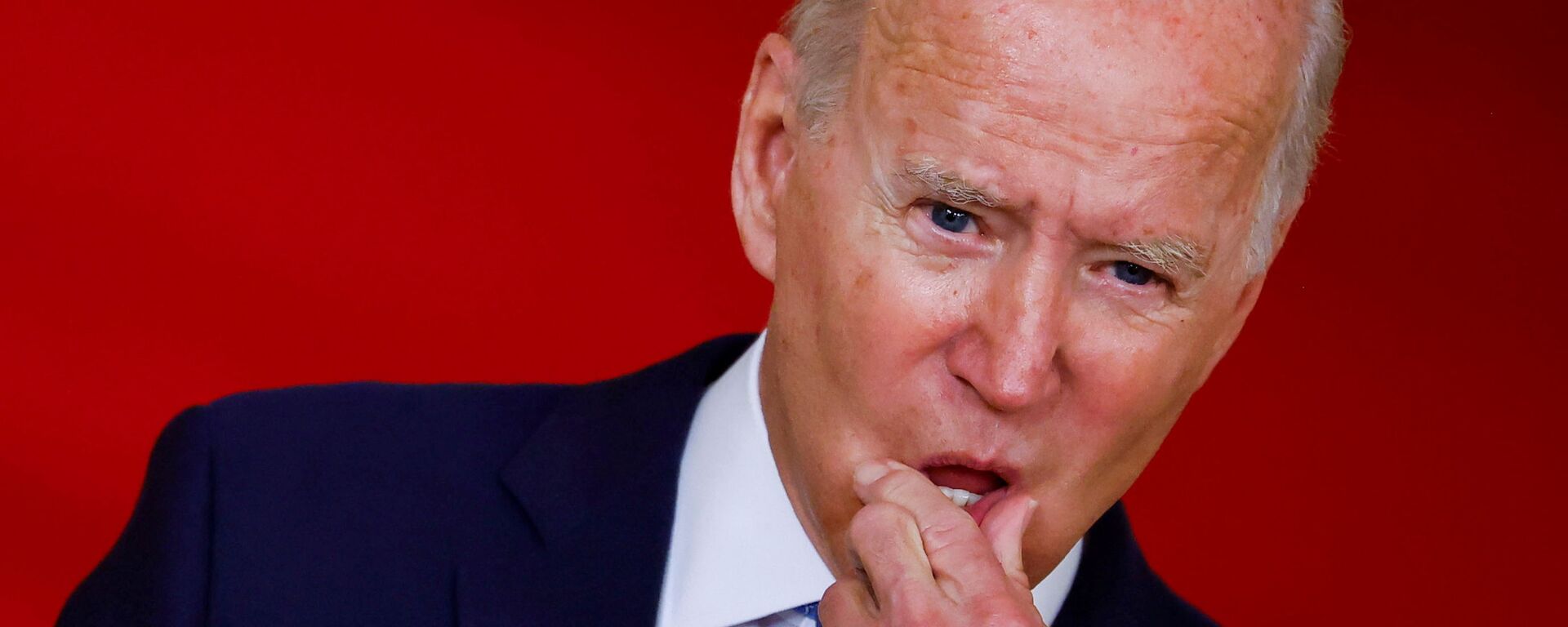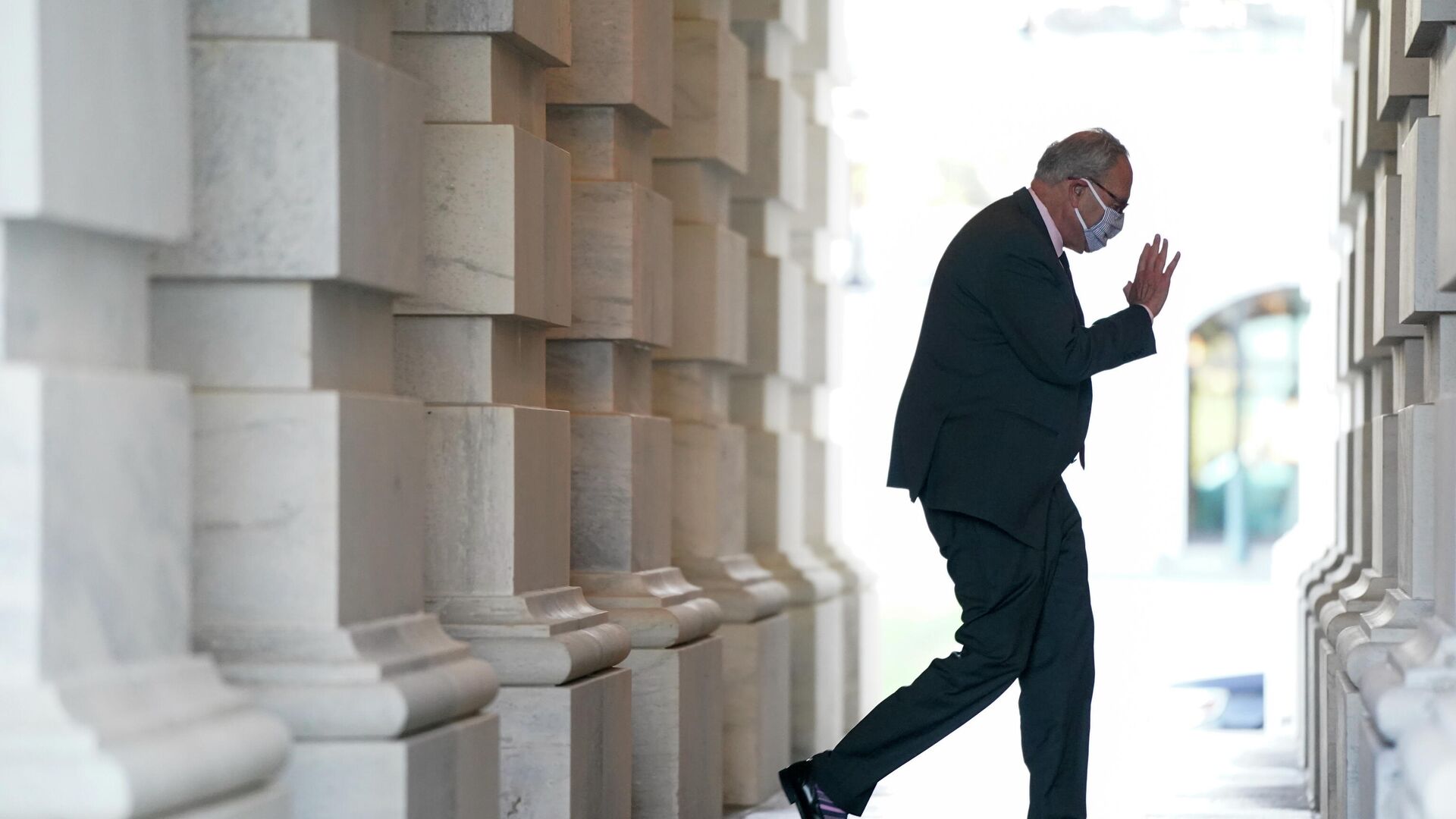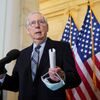https://sputnikglobe.com/20211022/republicans-block-voting-rights-legislation-reigniting-debate-over-ending-filibuster-1090117079.html
Republicans Block Voting Rights Legislation, Reigniting Debate Over Ending Filibuster
Republicans Block Voting Rights Legislation, Reigniting Debate Over Ending Filibuster
Sputnik International
On Wednesday, Republicans in the Senate blocked the Freedom to Vote Act — a bill claimed to strengthen federal voting rights — in a move likely to renew calls... 22.10.2021, Sputnik International
2021-10-22T00:20+0000
2021-10-22T00:20+0000
2022-12-19T13:59+0000
voting rights
democracy
republicans
us senate
filibuster
us
democrats
https://cdn1.img.sputnikglobe.com/img/07e5/0a/16/1090117042_0:0:3072:1728_1920x0_80_0_0_39987c71d3b7d9315662ceaa0b855ff5.jpg
The Senate voted 49 in favor to 51 against, falling short of the 60 votes needed to overcome a GOP filibuster. Senate Majority Leader Chuck Schumer (D-NY) reportedly changed his vote to a "no," in a procedural move that will allow him to submit the legislation for a re-vote and said the Senate will consider the John Lewis Voting Rights Advancement Act as soon as next week.Schumer's statement when he announced the vote demonstrated what was predicted of the debate.“I hope that our Republican colleagues will join us in good faith, and as I have said before, if they have ideas on how to improve the legislation, we are prepared to hear them, debate them, and if they are in line with the goals of the legislation, include them in the bill,” Schumer said.All 50 Republicans, however, unified for the third time this year to block its consideration — a sweeping election legislation that Democrats have supported as a powerful counterweight to new voting restrictions in conservative-controlled states.Senate Minority Leader Mitch McConnell (R-KY) had vowed Tuesday that Republicans would oppose the measure, according to a report from NBC News.The Freedom to Vote Act, which is known to contain similar provisions to the For the People Act (HR1) with terms that appease more to moderate Democrats, is claimed to give more flexibility to states and election officials in implementing some provisions, according to the Brennan Center.These include early voting and making Election Day a holiday — allowing automatic same-day voter registration and no-excuse mail voting, while also seeking to protect federal election records and local election officials from undue interference.US Senator Angus King (I-ME), who advocated for the US Senate to move forward with the major voting rights bill, recently eased his long-standing opposition to changing the filibuster rules, which require 60 votes for most legislation to proceed in the Senate.King was among the 49 Democrats and independents who voted in favor of starting floor debate on the Freedom to Vote Act, and acknowledged that weakening the filibuster would result in a “double-edged sword” under a Republican majority."I've concluded that democracy itself is more important than any Senate rule," said King.President Joe Biden said in a statement Wednesday after the vote that the Senate "needs to act to protect the sacred constitutional right to vote, which is under unrelenting assault by proponents of the Big Lie, and Republican Governors, Secretaries of State, Attorneys General, and state legislatures across the nation.""It is urgent," he added. "Democracy — the very soul of America — is at stake."Biden's statement did not mention making any changes to the long-standing filibuster rule, but he did emphasize how the right to vote should be simple and straightforward.“Let there be a debate and let there be a vote,” he added.White House Press Secretary Jen Psaki made implications in a press briefing Monday about Biden softening his opposition to filibuster changes after being asked if he’d reconsider his position on the filibuster if the Senate Republicans did block the Freedom to Vote Act.Meanwhile, the Democratic base is experiencing a great amount of pressure for Biden and Senate Democrats to take further action."They have failed to pass substantive legislation, and they are failing to act now," said Joseph Geevarghese, the executive director of Bernie Sanders-aligned group Our Revolution. "It needs to be made even more clear by the President that he is 100% on the side of the American people's most sacred right, and if that means fixing the filibuster, then we must do it for the sake of our democracy.”
https://sputnikglobe.com/20211007/progressives-vs-centrists-why-biden-cant-unite-even-his-own-party--why-it-may-end-badly-for-dems-1089747795.html
Sputnik International
feedback@sputniknews.com
+74956456601
MIA „Rosiya Segodnya“
2021
Adriana Montes
https://cdn1.img.sputnikglobe.com/img/07e5/09/10/1089141767_0:89:1270:1359_100x100_80_0_0_83cb4d432e11a31f4608d8cb59ecf006.jpg
Adriana Montes
https://cdn1.img.sputnikglobe.com/img/07e5/09/10/1089141767_0:89:1270:1359_100x100_80_0_0_83cb4d432e11a31f4608d8cb59ecf006.jpg
News
en_EN
Sputnik International
feedback@sputniknews.com
+74956456601
MIA „Rosiya Segodnya“
Sputnik International
feedback@sputniknews.com
+74956456601
MIA „Rosiya Segodnya“
Adriana Montes
https://cdn1.img.sputnikglobe.com/img/07e5/09/10/1089141767_0:89:1270:1359_100x100_80_0_0_83cb4d432e11a31f4608d8cb59ecf006.jpg
voting rights, democracy, republicans, us senate, filibuster, us, democrats
voting rights, democracy, republicans, us senate, filibuster, us, democrats
Republicans Block Voting Rights Legislation, Reigniting Debate Over Ending Filibuster
00:20 GMT 22.10.2021 (Updated: 13:59 GMT 19.12.2022) On Wednesday, Republicans in the Senate blocked the Freedom to Vote Act — a bill claimed to strengthen federal voting rights — in a move likely to renew calls among some Democratic leaders to alter filibuster rules.
The Senate voted 49 in favor to 51 against, falling short of the 60 votes needed to overcome a GOP filibuster. Senate Majority Leader Chuck Schumer (D-NY)
reportedly changed his vote to a "no," in a procedural move that will allow him to submit the legislation for a re-vote and said the Senate will consider the
John Lewis Voting Rights Advancement Act as soon as next week.
Schumer's
statement when he announced the vote demonstrated what was predicted of the debate.
“I hope that our Republican colleagues will join us in good faith, and as I have said before, if they have ideas on how to improve the legislation, we are prepared to hear them, debate them, and if they are in line with the goals of the legislation, include them in the bill,” Schumer said.
“But Republicans must come to the table to have that conversation and, at the very least, vote to open debate.”
All 50 Republicans, however, unified for the third time this year to block its consideration — a sweeping election legislation that Democrats have supported as a powerful counterweight to new voting restrictions in conservative-controlled states.
Senate Minority Leader Mitch McConnell (R-KY) had
vowed Tuesday that Republicans would oppose the measure, according to a report from NBC News.
"It is my hope and anticipation that none of us will vote for this latest iteration of Democratic efforts to take over how every American votes all over the country.”
Mitch McConnell
Senate Minority Leader
The Freedom to Vote Act, which is known to contain similar provisions to the
For the People Act (HR1) with terms that appease more to moderate Democrats, is claimed to give more flexibility to states and election officials in implementing some provisions,
according to the Brennan Center.
These include early voting and making Election Day a holiday — allowing automatic same-day voter registration and no-excuse mail voting, while also seeking to protect federal election records and local election officials from undue interference.

7 October 2021, 18:40 GMT
US Senator Angus King (I-ME), who advocated for the US Senate to move forward with the major voting rights bill, recently eased his long-standing opposition to changing the filibuster rules, which require 60 votes for most legislation to proceed in the Senate.
King was among the 49 Democrats and independents who voted in favor of starting floor debate on the Freedom to Vote Act, and acknowledged that weakening the filibuster would result in a “double-edged sword” under a Republican majority.
"I've concluded that democracy itself is more important than any Senate rule," said King.
President Joe Biden said in a
statement Wednesday after the vote that the Senate "needs to act to protect the sacred constitutional right to vote, which is under unrelenting assault by proponents of the Big Lie, and Republican Governors, Secretaries of State, Attorneys General, and state legislatures across the nation."
"It is urgent," he added. "Democracy — the very soul of America — is at stake."
Biden's statement did not mention making any changes to the long-standing filibuster rule, but he did emphasize how the right to vote should be simple and straightforward.
“Let there be a debate and let there be a vote,” he added.
White House Press Secretary Jen Psaki made implications in a
press briefing Monday about Biden softening his opposition to filibuster changes after being asked if he’d reconsider his position on the filibuster if the Senate Republicans did block the Freedom to Vote Act.
"Are [Republicans] going to protect this fundamental right? Or are they going to continue to be obstreperous — to use a word the president has used in the past — and put Democrats in a position where there's no alternative but to find another path forward?" Psaki said.
Meanwhile, the Democratic base is experiencing a great amount of pressure for Biden and Senate Democrats to take further action.
"They have failed to pass substantive legislation, and they are failing to act now,"
said Joseph Geevarghese, the executive director of Bernie Sanders-aligned group Our Revolution. "It needs to be made even more clear by the President that he is 100% on the side of the American people's most sacred right, and if that means fixing the filibuster, then we must do it for the sake of our democracy.”






